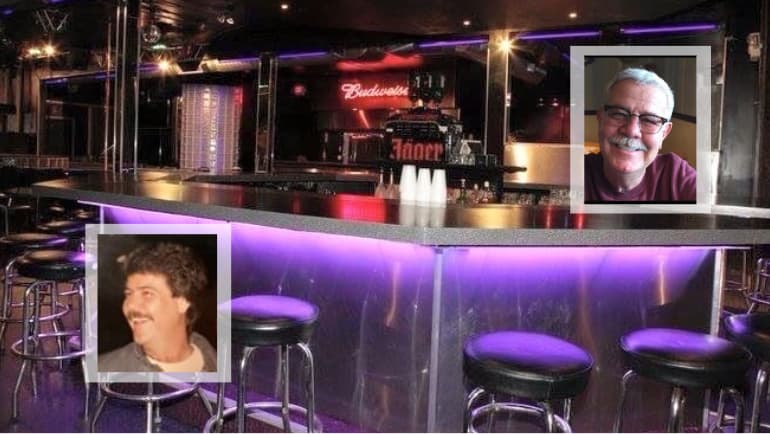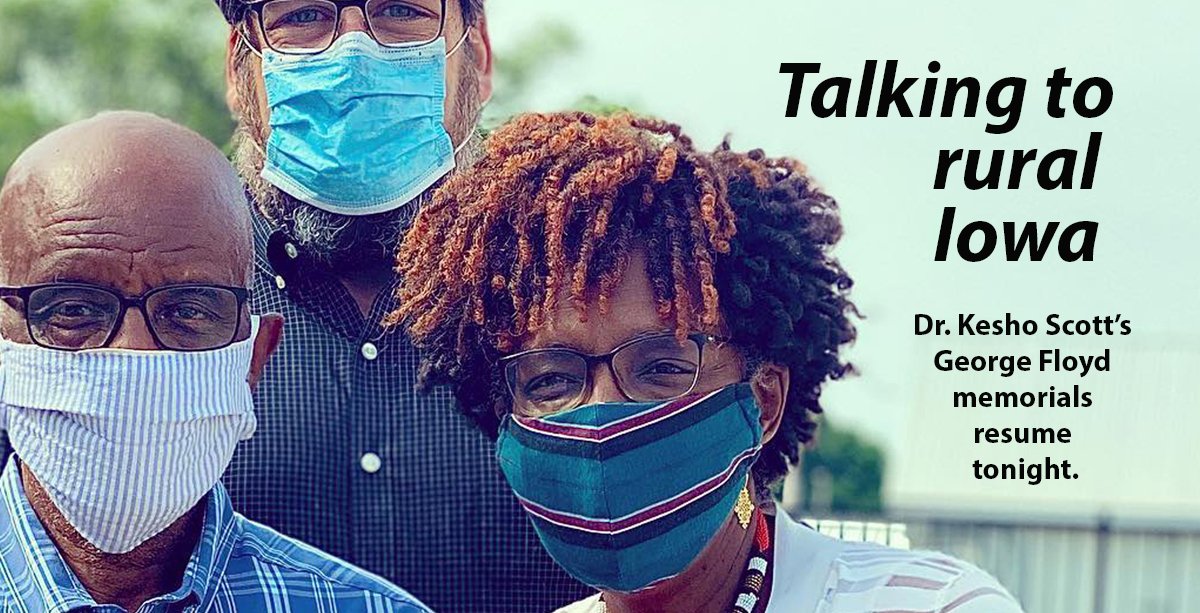In the Quad Cities, the moustached man known as JR Coffey helped being gay, doing drag, and standing up for AIDS become lasting sources of community in the 1990s and 2000s.
In Kewanee, the foster parent known mostly as Bill Coffey served up great food at two popular restaurants, and took his kids to a welcoming Methodist church every Sunday.
This week, Bill “JR” Coffey passed away after a seven-year battle with cancer and heart disease, leaving behind a legacy that was ahead of his time and is now felt across Illinois and Iowa.
“He was like a father figure to a lot of people,” says Alan Daniels, now of Cedar Rapids, Ia., while on the road to Carbondale, Ill. Daniels’ drag persona Anjila Cavalier is one of dozens who started their careers at the former JR’s Nightclub that Coffey ran in Rock Island, Ill., for more than 20 years. “He’s very much a pioneer for a lot of things that came after. He was instrumental for the entire community.”
Coffey left mark in the Quad Cities and Kewanee areas
Coffey, 68, ran JR’s Nightclub at 315 20th St. in Rock Island, Ill., from 1984 to 2002, and then briefly again from 2016 to 2017. Much of that time, his partner and eventually husband Eddie Jacoby was by his side.
“He was an angel,” says Jacoby, while juggling well wishes last week from the family’s friends throughout Iowa and Illinois. “He helped everybody out, and never told anybody ‘no.’ He had a way of connecting with each person individually, so they felt special. It was a gift that he had.”
The two met on the same Memorial Day weekend when Coffey first started WeCare Weekend in 1989, a fundraiser for HIV/AIDS prevention, and have been together ever since.
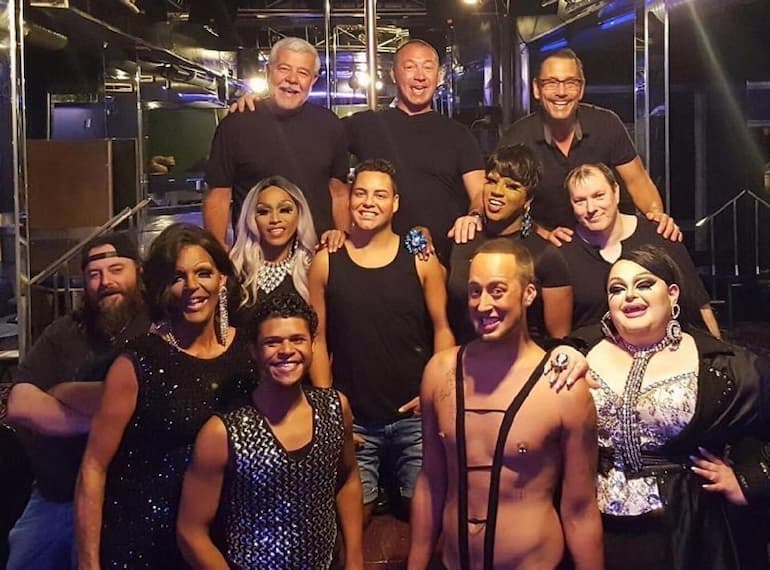
A picture from JR’s Nightclub in the 1990s shows Bill Coffey, upper left, and Eddie Jacoby, upper right, with numerous performers and staff members.
That fundraiser, which ended up raising around $100,000 annually for AIDS/HIV prevention and treatment for a decade, helped inspire creation of The Project of the Quad Cities, a nonprofit providing HIV treatment and prevention, harm reduction, LGBTQ+ health care and counseling.
Many also credit WeCare Weekends and JR’s summer “gay picnics” with inspiring the Quad Cities’ Pride gatherings every June.They were the first time in the area that hundreds of LGBTQ+ people and their friends and family had gathered for a public celebration.
During two different stints in the Kewanee area, Coffey and Jacoby pioneered in a different way: they owned and managed two restaurants in the area, including the Frank Lloyd Wright-influenced former Lakeside Restaurant (now Red Earth Cafe) at Johnson Sauk Trail State Recreation Area, and the Station House Restaurant.
Coffey built a reputation for his Mama’s Meatballs recipe, remembers Dianne Packee, a longtime friend of Jacoby and Coffey.
“They were just super-friendly, more so than most restaurants,” says Packee, who with her husband Dennie owns Kewanee’s Reiman Harley-Davidson. “They came around and talked to you at your tables. They got to know your families. They’re great people.”
Drag careers, AIDS activism in the Quad Cities started with Coffey, JR’s Nightclub
Decades before drag was appearing at mainstream brunches and public libraries, Coffey championed the art form. Throughout the 1980s and 1990s, Coffey and Jacoby built a stronghold of cutting-edge entertainment, unity and professionalism, say performers who worked for Jacoby and Coffey.
“They ran a tight ship,” remembers Jodie Santana, a long-time performer now based in southern Illinois who lived in the Quad Citiies and worked for JR’s for about 10 years. “We had rehearsals, and you had to be there for rehearsals. We did big production numbers. They treated us like we were family, and they treated us very good. It was probably my favorite time in my career.”
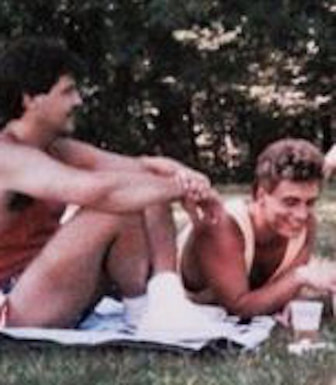
Bill Coffey, left, and Eddie Jacoby at a gay picnic organized by Coffey in the 1980s. (photo courtesy Eddie Jacoby)
In a move considered bold at the time, JR’s offered early-evening, 7 p.m. drag shows and experimented with all of the drag formats popular today, including brunches, and taking table reservations ahead of time.
Often, Santana says, Jacoby would ask she and other queens to walk with him throughout “the district,” which was how Rock Island’s downtown was known at the time.
“These people would just follow us back to JR’s, because they wanted to see a great show,” she remembers. “He was drawing the heterosexual community in, and really brought the community together, gay and straight, with drag. It was fun, cheap, you could laugh and cry and forget about your problems.”
Cavalier says the mingling with community beyond the bar was part of Coffey’s overall attempt to move with the area’s changes. The colorful, showy queens that performed at JR’s added a new element to a burgeoning casino and riverboat vibe, Daniels remembers.
“We wanted to be included, and that was the way,” he said.
And even if other places offered drag, JR’s had begun to take it to a new level, sponsoring several drag pageants. The quality and professionalism the pageants inspired helped many performers learn from each other and eventually excel nationally, Santana says.
Danielle Hunter, for example, went on to become a Miss Continental pageant winner. The late Natasha Richards went on to build a long career on the west coast of Florida. Many others – like Cavalier, Santana, Dena Cass and Dominique Zaire – remain, to this day, celebrated, highlight performers throughout Iowa and Illinois.
The bar is also credited with birthing a second era for the Quad Cities’ LGBTQ+ nightlife: JR’s is where Bobby Stansberry, founder of Davenport’s Mary’s on 2nd, learned the bartending trade. He held back tears during a phone interview last week about Coffey.
“He’s just a super, super great guy,” Stansberry said. “He’d do anything for anybody. And he was fun. And funny.”
Those qualities mattered in the 1990s especially, because of the AIDS epidemic, Stansberry said. It was a sad and difficult time, he said, and the uplift of Coffey, Jacoby and JR’s helped people handle the pain around them.
“Everybody around us was dying, and everybody was trying to help,” Stansberry said. “And people had nowhere to go.”
Coffey responded to the need for community by going beyond drag and LGBTQ+. He put up a rainbow-colored awning for years. He added a restaurant next door called Madison Square, which bustled for five hours daily.
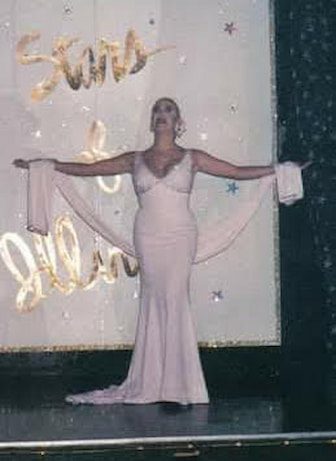
Jodie Santana, now of southern Illinois, performs on stage at the former JR’s Nightclub in Rock Island, Ill, in the early 1990s.
He began to offer male strippers along with drag queens, and other entertainment.
Jacoby says the Village People, Bonnie Poynter, and other non-drag entertainers also performed at JR’s. ”We always had top-rate entertainment.”
The club gained a reputation as a dance spot, drawing young adult women who brought their boyfriends. Bachelorette parties became common, Jacoby said. Eventually, doctors, lawyers, their wives and husbands, and “club kids” were attending JR’s along with the LGBTQ+ community.
Daniels remembers how comforting it was, even as JR’s changed, to see the “older generation” of gay men at JR’s on a regular basis. “That was nice to know there were older gays,” he said. “It was also a time when everybody talked to each other. There was no texting, no cellphones. You met with people, and you went out on dates.”
JR’s also tried to cater specifically to lesbians, Jacoby remembers, starting the Sirens bar within JR’s for a few years. Quad-City Times former managing editor Barb Ickes reminisced about the spot in 2016, sharing that it was where she met her life partner. “It gave us just what we needed: A way to be in the same place,” Ickes wrote. “We didn’t have to pretend to be casual friends. We didn’t have to hide the fact that all we really wanted to do was sit closely, look into each others’ eyes and feel our hearts race.”
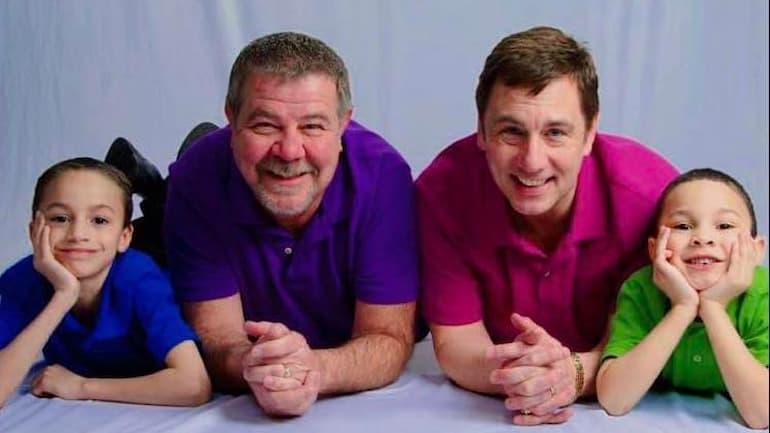
Bill JR Coffey and Eddie Jacoby left gay nightlife to focus on raising foster children. (photo courtesy Eddie Jacoby)
Changing times, desire for family life led to JR’s closing
After more than two decades of constantly evolving JR’s to fill the LGBTQ+ community’s needs, Coffey and Jacoby eventually needed to walk away from gay nightlife.
By the early 2000s, five LGBTQ-welcoming bars existed in downtown Rock Island, and more were forming in a new area of Davenport along the river. The Quad City Times wrote about how Davenport’s growing bar scene, online chat rooms and other ways of meeting people were emerging, adding to the competition.
Coffey took up a new management team’s offer to transform the nightclub into a strip club called The Body Shop that operated at the former JR’s for 12 years. Coffey and Jacoby built a new life in the Kewanee area, leading two restaurants there over 10 years. The Packees remember both the Lakeside Restaurant at the nearby state recreation area, and the Station House in downtown Kewanee, both of which featured not only Mama’s Meatballs, but also Coffey’s homemade rolls and cream puffs.
Coffey re-opened JR’s in 2016 for about six months, partly inspired by The Pulse Nightclub shooting in Orlando and the drive to provide the local LGBTQ+ community a safe, welcoming place.
By then, though, Coffey’s main priority had become his family: Jacoby and the two boys they were fostering. After suffering a heart attack in 2016, Coffey closed the 10,000-square foot building for good, and it sits in disrepair.
Jacoby said he and Coffey made it their focus to provide as much of a “regular” life as possible to their kids, including not only church-going but trips to Disneyland. He says Coffey never intended to be a community leader or role model. In fact, he was so humble about his leadership role in the Quad Cities, he refused to be interviewed for a documentary about the area’s history.
“People might not think this, but he just wanted to sit at his bar, and sit at his home watching the “Golden Girls” on TV,” Jacoby said. “He was just a typical guy that way. He was just a good-looking man with a great big heart; you just don’t find them that way anymore.”
The Packees said his love of being a homebody was evident almost everyday, as neighbors saw him diligently taking his kids to school and then walking the dog, no matter his health condition at the time.
“You couldn’t not like them,” says Dennie Packee. “Their personalities overwhelmed everything.”

Bill JR Coffey, 68, succumbed to a three-year battle with cancer Jan. 17 in Peoria. He was a pioneer of the LGBTQ+ community in the Quad Cities and ran two beloved restaurants in Kewanee while being a foster parent with hsi husband Eddie Jacoby.
A peaceful departure
The final challenge for Coffey started in May 2023. Coffey himself posted on Facebook that doctors had told him his lung cancer was spreading, and that chemotherapy and radiation would no longer be effective.
Shortly after Thanksgiving, Jacoby said. Coffey began to experience difficulty swallowing. Soon, fainting spells began. Doctors told him at the end of December that the lung cancer had spread to his brain and it was time to prepare for the end.
Jacoby and Coffey had already decided how to handle this phase of Coffey’s health condition. Coffey entered the Richard L. Owens Hospice Center in Peoria on Jan. 15. It was the same city where Coffey and Jacoby had spent their first weekend as a couple 37 years ago.
Jacoby said he spent the last day lying in bed with Coffey, holding his hand, and reading aloud tributes posted on social media. Those tributes continue.
“Some of the best times of my life were at JR’s. And I got to thinking that, if it wasn’t for JR, none of this would exist,” says Stansberry
“Your presence in our lives made us feel happy, loved and safe,” wrote Cavalier. “I will always hear your voice calling me ‘Girly Mon.’ “ WQAD personality Chris Minor posted about the trust and camaraderie she felt with Coffey, reminiscing about an attempted interview that went off the rails because Coffey kept saying “titty bar.”
Rather than an immediate celebration of life, Jacoby and Coffey’s friends plan to hold an event in his honor in a few months, likely in the Quad Cities.
“He wasn’t afraid to die,” Jacoby said. “I know that I had a blessed life with him. We had a big life. We were very blessed by having so many wonderful people in our life, gay and straight.”
(cover photo courtesy of Eddie Jacoby and features one of several interior bars at the former JR’s Nightclub in Rock Island, Ill.; a photo of owner Bill Coffey in his early 30s; and last year)

